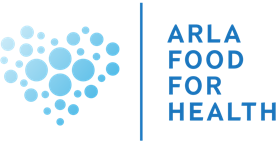Arla Food for Health Newsletter – October 2018
Publish date: 04. June 2018
Update on Arla Food for Health call 2018
The deadline for submissions of Expressions of Interest for the Arla Food for Health call was on the 15th of October. We received 10 Expressions of interest. We will make the final decision of which projects to fund and communicate the decision in December 2018 or January 2019.
News from funded projects
InfantBrain: The project focuses on improving the bioavailability of fat in infant formula to promote brain maturation in infants and is a large cross-disciplinary and cross-organizational project between Aarhus University, Copenhagen University, DTU, Bioneer, Semper, Arla Foods and Arla Foods Ingredients. It has been running for 2.5 years with funding from Arla Food for Health, Danish Dairy Foundation, and Innovation Fund Denmark.
Absorption of especially polyunsaturated fatty acids (LC-PUFA) from mothers milk or infant formula is believed to be of critical significance during the brain growth spurt, as the LC-PUFAs play an important role in the brain development and are not easily synthesized by the body.
To date, the project has uncovered effects of dairy processing harshness and choice of dairy raw material on chemical composition, stability, and dairy lipid structures as well as addressed fat absorption efficacy in model systems that have been established both in vitro and in vivo (piglets). The work has already led to several new discoveries that are published and will be in the future. The following year (2019) will focus on identifying if the parameters affecting digestion and absorption of fat also positively impacts cognitive development of preterm piglets. These results may hold promise for future dietary guidelines and new infant formula product development.
MAGMAM: The study aims to assess the effects of whey permeate and milk protein on growth, cognitive function and a number of other outcomes in children with moderate acute malnutrition in Uganda. The MAGMAM study is currently applying for ethics and other approvals to run the study. In parallel, we are working on finalising our four ready to use supplementary food formulations. Once finalised they will be developed as prototypes. We have enrolled one PhD student in Denmark and selected two Ugandan PhD students. The study will be conducted from community health centres in three districts in Eastern Uganda. Selection of these centres is planned for October. The Danish team will visit Uganda in November with the aim to build on what is already underway in the study development.
DAIRYMAT: The aim is to deduce the role of the dairy food matrix, testing samples ranging from liquid, visco-elastic to solid, but with identical macronutrients, fat, protein, carbohydrate, calcium and salt in relation to digestion and uptake of lipids with emphasis on postprandial lipaemia. Formulation of the four different experimental dairy samples are finalized: Commercial semi-hard Cheddar cheese (reference), a blended and homogenized Cheddar cheese, a “milk” with increased casein and fat content and a cold-set gel based on addition of GDL to the “milk”. The four samples represent food structures/textures that can be related to commercial products e.g. cheese, cream cheese, drinks/smoothies, yoghurt.
A human study with iso-caloric meals will begin end of October 2018 carried out at University of Copenhagen. A range of parameters and metabolites are analyzed at University of Copenhagen and Aarhus University in postprandial blood samples, e.g. the difference in triglyceride concentration, free fatty acids, apolipoproteins ect.
At the same time, the four samples be will analysed at Aarhus University by in vitro digestion, determination of free fatty acid release, rheological characterization, microstructure by confocal microscopy and solid fat content by low-field NMR measurements.
D-PRO: Consumption of milk and milk proteins as well as vitamin D have been positively associated with bone health, growth, lean mass, muscle strength and cardiometabolic health. However, most randomized trials have been conducted in adults and we lack evidence in children. On 1st October 2018 a new AFH-funded project, D-pro, was kicked off. The 3½-year project is led by researchers with expertise in child nutrition at Department of Nutrition, Exercise and Sports, University of Copenhagen and the aim is to investigate the combined and separate effects of milk protein and vitamin D on bone health, growth, muscle strength, body composition and cardiometabolic health in 6-8 year-old children. The core activity is a randomized 1-year trial with 200 children conducted at University of Copenhagen during 2019-2020 together with researchers from Department of Public Health, Aarhus University, who will lead method development and reliability studies as well as measurements of children’s muscle strength and function in the trial. Development and testing of study products has been initiated in collaboration with Arla and two PhD students will be recruited during the winter. The study will be the first of its kind in children and is expected to contribute to our understanding of how milk protein and vitamin D affect children’s bone health, growth and muscle strength and help elucidate the potential synergistic effects of these nutrients.
Arla Food for Health on High Tech Summit
Arla Food for Health was represented with speakers from CutDM and OmniSam at High Tech Summit at DTU in October with a session on “Digitalized solutions as a lever to personalized nutrition”. Presentations were given on “Industry perspectives on future possibilities in driving healthy eating” (Director Anne Louise Mørkbak), “Perspectives in continuous blood sugar control” (PhD Mads Thomsen) and “Maximizing Satiety by Designing Foods Based on Multi-modal Metrics of Blood, Brain and Behavior” (Professor Derek Byrne). Thanks to all the contributors.
Arla Food for Health Conference
Arla Food for Health will again host an event in 2019 scheduled for May the 2nd and the venue will be Arla Innovation Center. An invitation has been sent out to ensure that you book the date. We will use the same format as this year. It is possible for the Principle Investigators to bring each 5 persons involved in the project.
